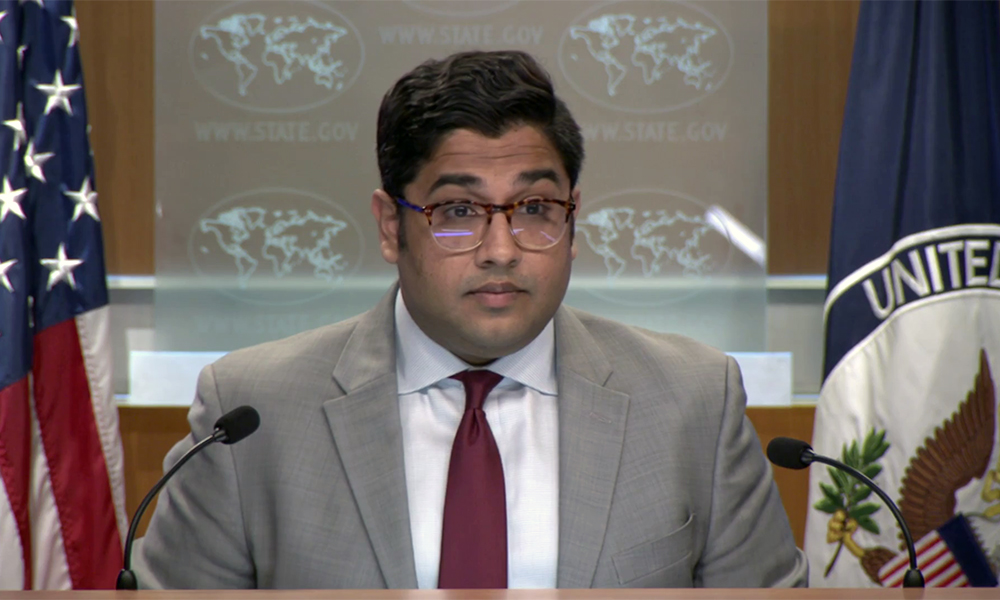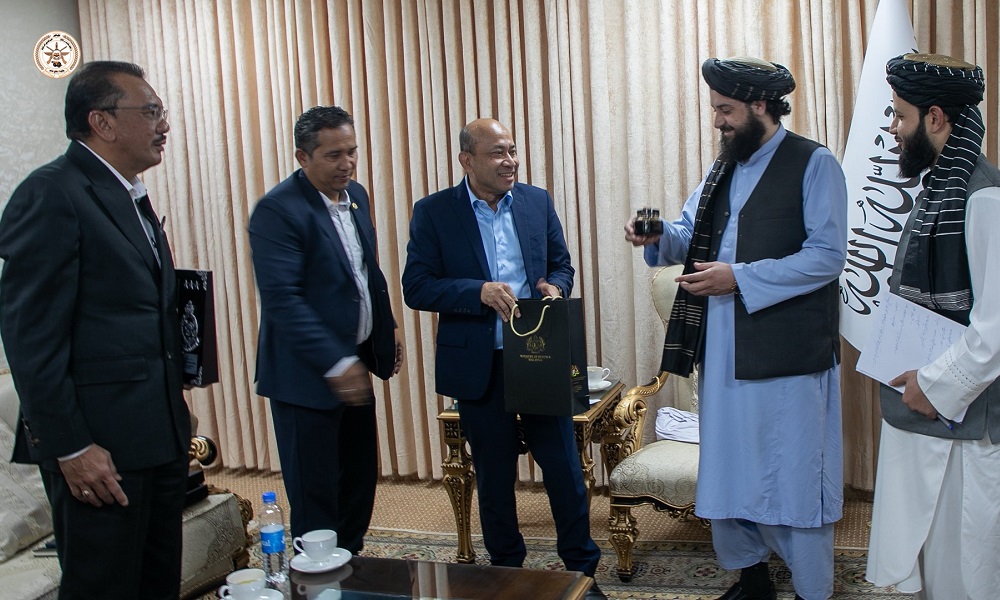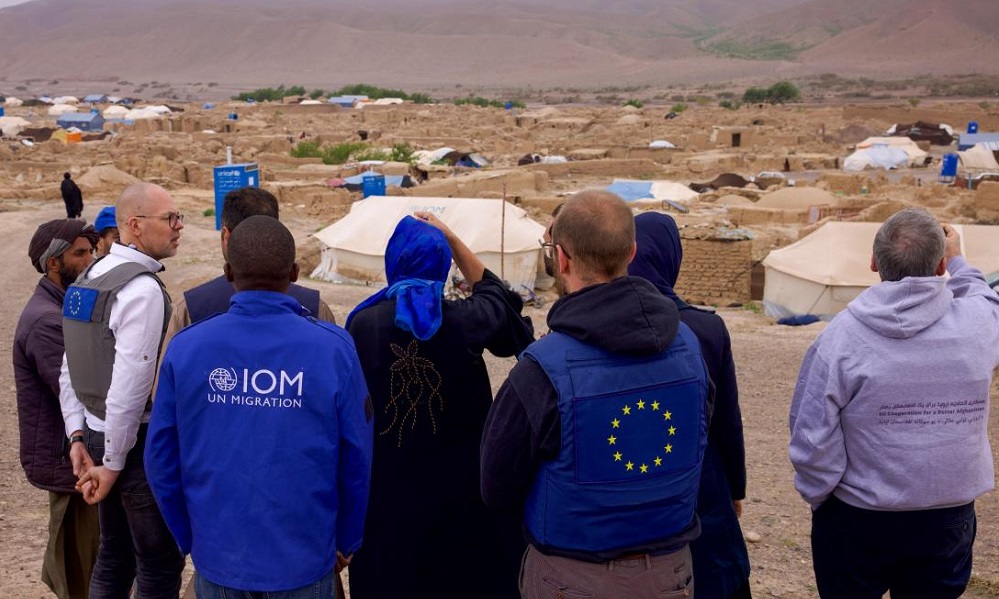Latest News
US: IEA’s treatment of Afghan women a major concern for Washington

The US State Department’s deputy spokesperson, Vedant Patel, said Monday that the actions of the Islamic Emirate against women are becoming a big concern for Washington.
“Let me say a couple of things. First and foremost, as it relates to Afghanistan and the Taliban (Islamic Emirate of Afghanistan), its treatment of women and girls, its lack of human rights, basic human rights in everyday society, continues to be something of great concern to us and something that we have continued to make clear to the Taliban is unacceptable to us as it goes about its own desired journey for legitimacy,” said Patel.
He said America has implemented measures to prevent the IEA from accessing humanitarian aid.
But the Islamic Emirate accuses the US of abusing the term – women’s rights in Afghanistan – and says that the US uses this issue as a tool of pressure.
This comes after UNAMA said in a report Monday that the Islamic Emirate has arrested a significant number of women and girls, mainly from the Hazara region of Dasht-e-Barchi and some in Khair Khana, for not observing the hijab in accordance with Sharia.
The IEA in turn responded by slamming the report, and stating UNAMA was insulting the beliefs of the nation.
Patel told reporters that the United States has tried to prevent humanitarian aid and American taxpayers’ money from reaching the Islamic Emirate.
He said: “There are a number of steps and measures that are in place to ensure that U.S. humanitarian aid does not end up in the hands of the Taliban (Islamic Emirate).”
He added: “We work closely with trusted NGOs and other entities who we’ve had long-established relationships with, and there are measures and vetting and other processes in place to ensure that the hard-earned money from the American taxpayer does not end up in the hands of the Taliban.”
The United Nations has also said that the money donated by the world to this organization is in its accounts and the Islamic Emirate does not have access to it.
Latest News
Tripartite trade meeting held in Kabul to boost regional connectivity

A tripartite meeting between the delegations of Afghanistan, Turkmenistan and Kazakhstan was held in Kabul with the aim of connecting North Asia to South Asia and reducing transit and transportation costs among these three countries, the Ministry of Trade and Commerce said in a statement.
In this meeting, an agreement was reached on the creation of a joint technical committee to continue the talks.
This tripartite meeting was held under the leadership of Nooruddin Azizi, the Acting Minister of Industry and Commerce, Vice President of Turkmenistan and Srik Zhumangarin, the Deputy Prime Minister of Kazakhstan.
Earlier, a bilateral meeting was held between the delegation of the Islamic Emirate and Turkmenistan. The ministry of commerce said the participants of the meeting discussed the construction of a large joint logistics center in Torghondi, the trilateral transit agreement between the IEA, Turkmenistan, and Kazakhstan, the expansion of Afghanistan’s railway, solving issues related to Afghan transit and export goods, and a number of other commercial issues.
Latest News
No destructive groups including Daesh present in Afghanistan: Yaqub Mujahid

Acting Minister of National Defense Mohammad Yaqub Mujahid has said that no destructive groups including Daesh have physical presence in Afghanistan, adding the Islamic Emirate of Afghanistan (IEA) will not allow anyone to pose threat to any country in the region from the Afghan soil.
Mujahid made the remarks in a meeting with a delegation from Malaysia in Kabul on Thursday.
According to a statement released by the Ministry of Defense, Mujahid highlighted Malaysia’s “good treatment” of Afghan refugees and its long-standing relations with Afghanistan, and said that Malaysia is a powerful Islamic country and visits should increase.
He added that with the establishment of the Islamic Emirate, occupation and war ended in Afghanistan, and the country is fully secure.
Based on the statement, the Malaysian delegation called Afghanistan a friendly country and while emphasizing on comprehensive cooperation, it assured that what they have seen in Afghanistan will be shared with the authorities of their country.
Latest News
EU allocates 17 million euros to support Afghans on the move

The European Union signed an agreement worth 17 million euros with the International Organization for Migration (IOM) to improve access to basic services, increased economic opportunities and protection for Afghans on the move and their host communities in Afghanistan.
The needs of women and girls are a particular focus of the programme, EU said in a statement released on Thursday.
The statement noted that from January 2023 until April 2024, over 1.5 million Afghans returned from Pakistan and Iran.
“I am deeply moved by the hardship returnees face when being deported to Afghanistan. In a country suffering from poverty and climate change, and in a city that just saw devastating earthquakes, this truly is a crisis within a crisis.”, said Peteris Ustubs, Director for the Middle East, Asia and Pacific of the European Commission’s Department for International Partnerships during the signing ceremony at the IOM transit centre in Herat.
Raffaella Iodice, EU Chargée d’Affaires a.i. to Afghanistan, added “The solidarity of the Afghan people towards their brothers and sisters is an inspiration. We must assure that communities hosting and helping new arrivals are supported. The partnership with IOM ensures access to essential services and provides protection for Afghan returnees and their host communities. As women and girls can be particularly affected, we make sure that all members of society can benefit”.
“IOM’s continued partnership with the EU has been critical in enabling our teams to reach hundreds of thousands of Afghan returnees and other vulnerable communities in the country”, said IOM Afghanistan Chief of Mission, Maria Moita. “Thanks to this renewed commitment, we will be able to focus on addressing the immense challenges in the areas of return and contribute to reintegration, social cohesion, and longer-term solutions for those communities.”
This additional contribution is part of a 5-year programme that is being implemented across Afghanistan and in four countries in the region. It builds on the EU’s previous support to IOM to improve the wellbeing of Afghans forced to return to the country, EU said.
-

 Latest News3 days ago
Latest News3 days agoRashid Khan named AWCC’s brand ambassador
-

 Regional4 days ago
Regional4 days agoIranian president lands in Pakistan for three-day visit to mend ties
-

 Sport4 days ago
Sport4 days agoKolkata beat Bengaluru by one run in IPL as Kohli fumes at dismissal
-

 Sport4 days ago
Sport4 days agoACL: Aino Mina 3-0 Istiqlal Kabul; Attack Energy 3-0 Khadim
-

 Climate Change4 days ago
Climate Change4 days agoRescuers race to reach those trapped by floods in China’s Guangdong
-

 Business5 days ago
Business5 days agoAfghanistan, Kazakhstan to hold joint expo in Kabul
-

 World3 days ago
World3 days agoMalaysian navy helicopters collide in mid-air, 10 killed
-

 Sport3 days ago
Sport3 days agoJaiswal ton powers Rajasthan to big IPL win
























